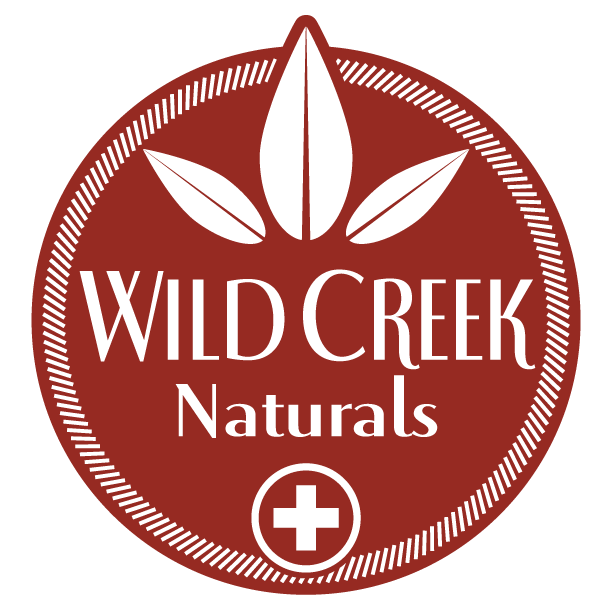We recently had someone contact us about whether they could use Marseilles Remedy (our thieves style oil based on the recipe founded during the Black Plague), on their pets because of the Eucalyptus Oil in it.
Before I answer this let me give you a little background on myself.
My name is Casey and I’m the founder of Wild Creek Farms – formerly Salt Spring Naturals.
I studied Chemistry at the University of Victoria, hold a technical diploma in Applied Chemistry and Biotechnology, I’m a Primary Care Paramedic with BC Ambulance and the main poop-shoveller-animal-husbander here at Wild Creek Farm.
Our family has been making Marseille’s Remedy for decades and I am often asked if it’s safe to use on animals. My facetious answer is to make a stern face and tell them “I don’t pay my kids to work and of course we test our products on animals”… But in all seriousness, there is a lot of misinformation on the internet about the safety of Eucalyptus. Since it’s one of the ingredients in Marseille’s Remedy hopefully I can help clear some of that rhetoric.
Eucalyptus is toxic – that’s why it works so well
Just so happens it’s more toxic to Prokaryotes than Eukaryotes, that’s why it works so well. 1,4-CineoleIsocineole is the active monoterpene and it’s neurotoxin in large amounts. It can damage nerve cells once a threshold is reached in the body. When it’s under that threshold, it is totally harmless to our cells but especially toxic to bacteria, amoebas and fungi. It disrupts viruses and because parasites are so small their threshold toxicity is much lower than ours.
In fact all antibiotics are toxic
All antibiotics work on the same principle. All antibiotics are toxic. Antibiotics damage bacteria more than they damage you. However, Cineole is not an antibiotic: it’s a volatile aromatic cyclic ether naturally occurring in all species of Eucalyptus. It’s also found in many other plants such as rosemary, mint and sage.
Cineole is also a naturally occurring beta-2-agonist and an excellent expectorant. Hence why it’s the main ingredient in almost every cough syrup and cough lozenge. Sometimes called Eucalyptol or just Cineole because there is so much misinformation around Eucalyptus that companies try to find creative terms to put it on their ingredient lists.
Eucalyptus toxicity it is also very effective at killing microbes
It was a widely used hospital sanitizer and it’s still used for cleaning catheters.
It’s also extremely volatile and very good at penetrating tissues. That’s why when you put a dab of Marseille’s on a boil the infection is quickly and drastically reduced.
In order for someone to injure themselves with it they would need to ingest a respectable volume of it very quickly. It evaporates out of the body almost as fast as it could be ingested and absorbed.
So can Marseilles Remedy be used on animals like cats, dogs etc…?
The worry with small animals is it would take a lot less to cause them harm. Simply smelling it will not have any negative effect on a cat, small dog or bird. But if there was a concentrated puddle they licked up, it might give the animal a headache or cause the animal to vomit.
If someone is using so much of the product that it’s hurting their pets then they are using way too much and I doubt they could handle being in the room with it themselves at those potent concentrations in the air.
Koalas live on a diet that consists only of Eucalyptus, and one of the reasons they can do this is the Cineole evaporates out of their system faster than they can eat the aromatic leaves.
So the short answer to is it safe to use around pets is: Yes, it’s totally fine! Just not too much. Same as if there is a small child in the room. Use in moderation.
Is it safe to use on pets? the easy answer to that is no. The truth is it’s totally safe to put on pets as long as you don’t use too much, and don’t put it on a spot where they can lick at it.
But because people have a tendency to go overboard, I would only recommend that a couple drops be used on their collars where they cannot lick at it. One big factor to keep in mind when using Marseille’s around pets is it’s spicy. It could cause them discomfort if they got some undiluted on their skin or in their eyes.
Here’s how we use Marseilles Remedy on our animals at the farm
Here on our farm; we use Marseille’s on our animals to treat skin infections from fly strike, fungal foot on the goats, sheep, and ponies. We used it a number of times on our german shepherd when she got a nasty infection from fighting with another dog. And our Chihuahua has been exposed to it everyday for about seven years now. She sits on a couch near the boot area when we work and it does get a bit potent in here at times. She’s never expressed any discontent or behavior changes after and loves watching us work.
We also have a large equestrian following who use our balm and oil on horses hooves for fungus and flystrike religiously with excellent results.

